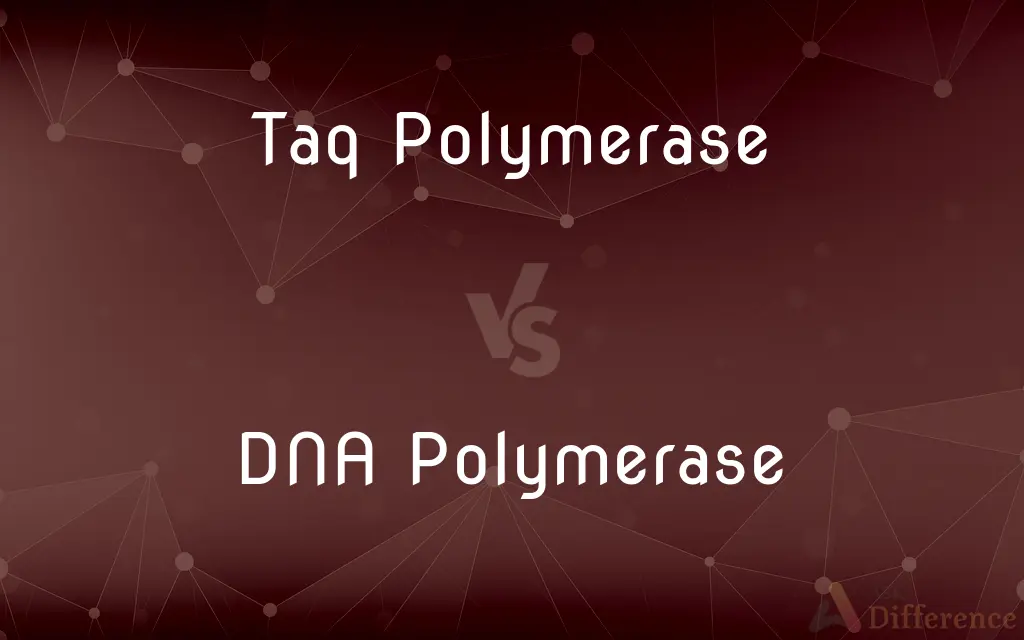Taq Polymerase vs. DNA Polymerase — What's the Difference?
By Tayyaba Rehman — Published on December 15, 2023
Taq Polymerase is a DNA polymerase isolated from Thermus aquaticus that withstands high temperatures, while DNA Polymerase refers to enzymes that synthesize DNA molecules, not necessarily thermostable.

Difference Between Taq Polymerase and DNA Polymerase
Table of Contents
ADVERTISEMENT
Key Differences
Taq Polymerase and DNA Polymerase are fundamentally connected yet distinct due to their origins and properties. Taq Polymerase is a specific type of DNA Polymerase, derived from the thermophilic bacterium Thermus aquaticus, known for its ability to withstand high temperatures without denaturing. DNA Polymerase, on the other hand, is a generic term that encompasses a range of enzymes that are responsible for synthesizing DNA molecules by assembling nucleotides, the building blocks of DNA.
Taq Polymerase, due to its thermostability, plays a critical role in Polymerase Chain Reaction (PCR), where it synthesizes new DNA strands in high-temperature cycles without degrading. DNA Polymerase, depending on the type, may not necessarily possess the ability to function optimally under such high-temperature conditions, limiting their utility in processes like PCR that involve recurrent heating and cooling cycles. Thus, the heat stability of Taq Polymerase becomes a pivotal factor in distinguishing it from many other DNA Polymerases.
A notable application difference between Taq Polymerase and general DNA Polymerases lies in experimental and technological contexts. The application of Taq Polymerase is most commonly seen in techniques like PCR because it can facilitate DNA synthesis during the high-temperature denaturing stages of the reaction, which would incapacitate most other DNA Polymerases. DNA Polymerases, broadly, have diverse applications across various DNA replication and repair processes, with different types being employed based on their specific properties and the requirements of the biological or experimental system.
It’s worth noting that while Taq Polymerase is celebrated for its thermostability, this is not a universal trait among all DNA Polymerases. DNA Polymerases can be derived from a plethora of organisms and cellular components, each with unique characteristics, functionalities, and optimal conditions for use. Some DNA Polymerases have proofreading abilities, which Taq Polymerase lacks, and this can be a crucial consideration in experimental design, where fidelity in DNA synthesis is paramount.
In general, Taq Polymerase serves as a quintessential example of the utility of a specialized DNA Polymerase, demonstrating how unique characteristics of a particular enzyme, such as thermostability, can be harnessed for specific technological applications. In contrast, DNA Polymerases as a broader category underline the diversity and adaptability of biological systems in DNA synthesis and repair, showcasing a myriad of mechanisms and applications that facilitate life across diverse organisms and conditions.
ADVERTISEMENT
Comparison Chart
Source
Thermus aquaticus
Various organisms
Thermostability
High
Varies
Application in PCR
Commonly used
Not all are suitable
Proofreading Ability
Lacks
Varies
General Usage
Specific (e.g., PCR)
Broad (synthesis, repair, etc.)
Compare with Definitions
Taq Polymerase
Taq Polymerase plays a pivotal role in PCR.
Taq Polymerase facilitates the amplification of DNA during PCR cycles.
DNA Polymerase
DNA Polymerase can be derived from various sources.
Different organisms contribute diverse DNA Polymerases with distinct properties to scientific research.
Taq Polymerase
Taq Polymerase is derived from Thermus aquaticus.
The bacterium Thermus aquaticus provides Taq Polymerase, vital for various biotechnological applications.
DNA Polymerase
DNA Polymerase enzymes facilitate DNA synthesis.
DNA Polymerase elongates DNA strands by adding nucleotides during replication.
Taq Polymerase
Taq Polymerase lacks proofreading abilities.
The absence of proofreading in Taq Polymerase sometimes necessitates alternative enzymes for high-fidelity applications.
DNA Polymerase
DNA Polymerase is essential in cellular replication.
During cell division, DNA Polymerase is instrumental in replicating the cell's genome.
Taq Polymerase
Taq Polymerase can synthesize complementary DNA strands.
During PCR, Taq Polymerase synthesizes the complementary strands of targeted DNA sequences.
DNA Polymerase
Some DNA Polymerases have proofreading capabilities.
High-fidelity DNA Polymerases can correct mismatches during DNA synthesis, enhancing replication accuracy.
Taq Polymerase
Taq Polymerase is renowned for its thermostability.
Taq Polymerase is utilized in PCR due to its ability to function at high temperatures.
DNA Polymerase
DNA Polymerase is involved in DNA repair processes.
DNA Polymerase plays a crucial role in repairing damaged DNA strands to maintain genomic integrity.
Common Curiosities
Do all DNA Polymerases have thermostability like Taq Polymerase?
No, thermostability is a distinctive feature of Taq Polymerase, not shared by all DNA Polymerases.
How is DNA Polymerase involved in DNA synthesis?
DNA Polymerase synthesizes new DNA strands by adding nucleotides during DNA replication and repair.
Why is Taq Polymerase significant in PCR?
Taq Polymerase can withstand the high temperatures in PCR, enabling DNA synthesis during the process.
What is the source organism of Taq Polymerase?
Taq Polymerase is isolated from the thermophilic bacterium Thermus aquaticus.
Does Taq Polymerase have proofreading ability?
No, Taq Polymerase lacks the ability to proofread and correct errors during DNA synthesis.
What is Taq Polymerase?
Taq Polymerase is a thermostable DNA Polymerase derived from the bacterium Thermus aquaticus.
How does Taq Polymerase tolerate high temperatures?
Taq Polymerase has a stable protein structure that resists denaturation at high temperatures typical in PCR.
Are there different types of DNA Polymerase?
Yes, there are various types of DNA Polymerases, each with unique properties and functions.
Can DNA Polymerase be used in PCR?
Some DNA Polymerases can be used in PCR, but their utility might be limited by their thermostability.
How do DNA Polymerases facilitate DNA repair?
DNA Polymerases can synthesize new DNA strands during repair processes, replacing damaged sections of DNA.
Are DNA Polymerases specific to certain organisms?
No, DNA Polymerases are found across all organisms but can have variations in their properties and functions.
Is Taq Polymerase the only polymerase used in PCR?
No, other thermostable polymerases, like Pfu Polymerase, are also used in PCR for various purposes.
Can Taq Polymerase and DNA Polymerase be used interchangeably in experiments?
Not always, as the choice between Taq Polymerase and other DNA Polymerases depends on the specific requirements of the experiment, such as the need for thermostability or proofreading.
What is the general role of DNA Polymerase in cells?
DNA Polymerase plays a critical role in DNA replication and repair within cells.
Is Taq Polymerase used in applications other than PCR?
Yes, Taq Polymerase can be used in other techniques, like DNA sequencing and cloning, that require DNA synthesis.
Share Your Discovery

Previous Comparison
Salsa Dance vs. Ballroom Dance
Next Comparison
Must vs. Ought ToAuthor Spotlight
Written by
Tayyaba RehmanTayyaba Rehman is a distinguished writer, currently serving as a primary contributor to askdifference.com. As a researcher in semantics and etymology, Tayyaba's passion for the complexity of languages and their distinctions has found a perfect home on the platform. Tayyaba delves into the intricacies of language, distinguishing between commonly confused words and phrases, thereby providing clarity for readers worldwide.












































